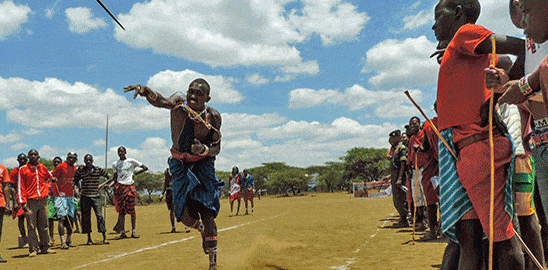As part of the Why I Love Kenya campaign, and alongside our own small contribution to a country I still consider my home from home, we aim over the next few weeks to help signpost a number of the initiative’s excellent reasons for making Kenya a bucket list must. This week, it’s the Maasai Olympics.
As a boy one of my favourite parts of visiting a Maasai manyatta or homestead was the chance to watch – and kind of take part in – the vertical jump and rungu throwing. The jumping I loved, especially when the warriors tried to out jump each other. I couldn’t believe how high they went, the sound the men made as they jumped. They felt to me like they were possessed of superhuman powers, the noise a strong back of the throat murmur, the sound flooding in waves across the top of my head.
Afterward, I could always find an old warrior who would coach me in the arts of rungu throwing. A rungu is a fighting stick, heavy, well-worn and designed to fell assailants at a distance as well as in close combat scenarios. After showing me how to hold and throw it, the elder would invariably hold up his shield for target practice, and I’d have a crack, much to the amusement of many a Maasai onlooker.

Designed to demonstrate a warrior’s prowess, to impress, introduce and attract, vertical jumping and rungu and spear throwing traditionally and until very recently serves as subsidiary to the main test of a man’s true worth, that of killing a lion in one-to-one combat. Of course, this extraordinarily important rite of passage was to prove unsustainable, it’s outlawing necessary to the survival of Kenya’s populations of lion. However, the effect of the ban was to remove, from the point of view of the young warrior, the means of truly becoming a man. Enter the Maasai Olympics.
Previous to making a competitive sporting event of jumping, throwing and running, and apart from their original functions, these rituals had become more and more an aspect of show, put on for the benefit of guests, people like my young self. The idea that they could be taken further, that different regions could compete for medals and titles, was seen as a way of reintroducing the sense of pride and proof of manhood once achieved via a lion kill. Introduced in 2012, they’ve proved a real success, with the Kenyan Olympic 800m gold medallist David Rudisha the games’ official patron.
So, your interest piqued, do have a look at what the campaign’s up to, and perhaps, dare I say it, join up. We need you. #whyilovekenya
